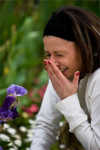Spring Colds: The Rhinovirus With No Limits

(NewsUSA) - Often, for many people who think that cold and flu season is behind them, rising temperatures in the spring bring a false sense of security. But what few people realize is that it is still possible to get a cold.
Colds are more common in the fall and winter because most of the 200 known viruses that cause colds are active during that time. Add to the equation the belief that viruses survive better indoors, the place where most people stay during the winter, and you have a recipe for disaster. But despite the frequency of fall and winter colds, a spring cold should not be ignored.
Allergies can tax your body, making it more vulnerable to cold viruses. It's easy to confuse cold and allergy symptoms. But colds tend to come on gradually, can create aches, chills and fevers and typically last a week or less. Allergy symptoms start almost immediately upon contact with the allergen. If "hay fever" symptoms like itchy eyes or a running nose last for more than two weeks, they're probably caused by allergies.
If you discover that you have a cold, get your rest and drink plenty of fluids. There are plenty of over-the-counter medications that can relieve your symptoms, but why go through the misery of having symptoms like itchy eyes, a runny nose and sore throat when you can simply boost your immune system so that you don't fall sick? Prevention is always the best remedy.
According to a recent study published in the Archives of Internal Medicine, getting adequate sleep can go a long way toward improving your immune system. The participants who slept less than seven hours were about three times more likely to get a cold than people who slept eight hours or more a night.
Much like getting enough sleep, a little help from supplements can also mean huge gains for your immune system. For instance, Frankincense and Myrrh, makes a "Cold and Flu Prevention Rubbing Oil," which helps support strong immune function. The homeopathic formula contains soothing essential oils like eucalyptus, cinnamon, lemon, rosemary, clove, frankincense and myrrh. Users simply massage the oil into their feet and ankles once daily, promoting relaxation while boosting the immune system.
In addition to proper sleep and herbal remedies like Frankincense and Myrrh, other methods of keeping colds at bay include washing your hands frequently throughout the day and maintaining a healthy diet.
